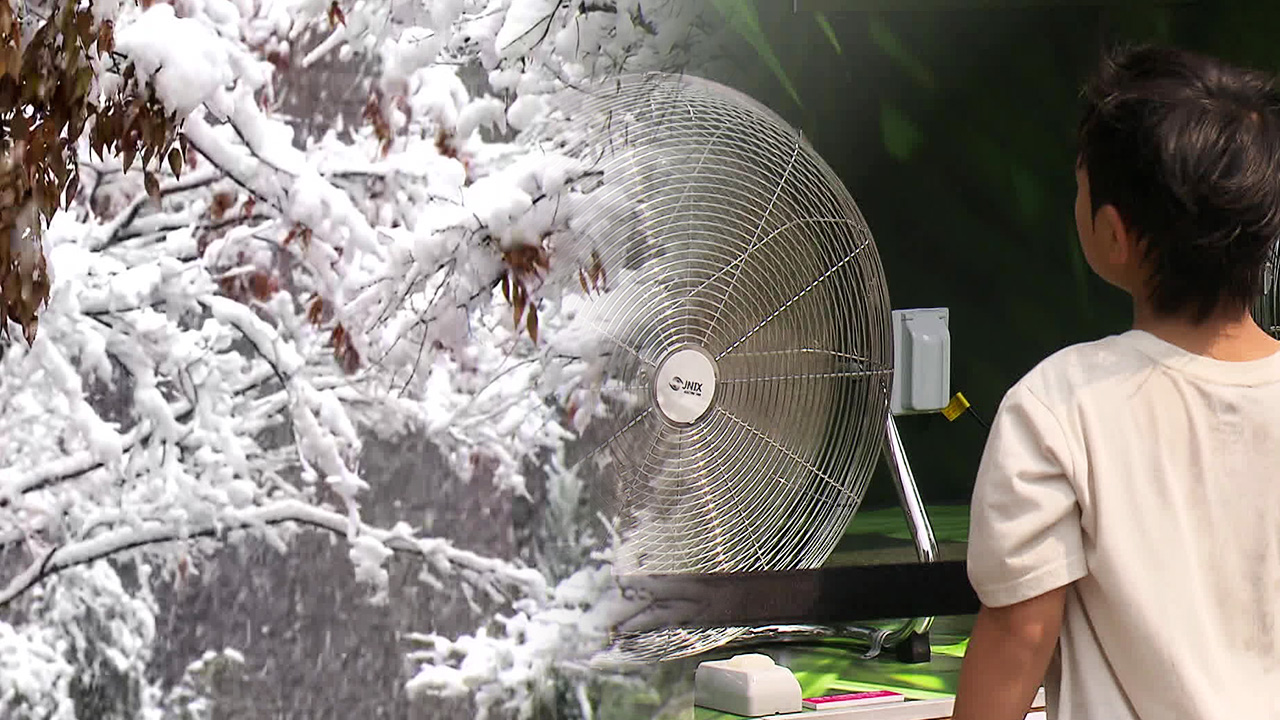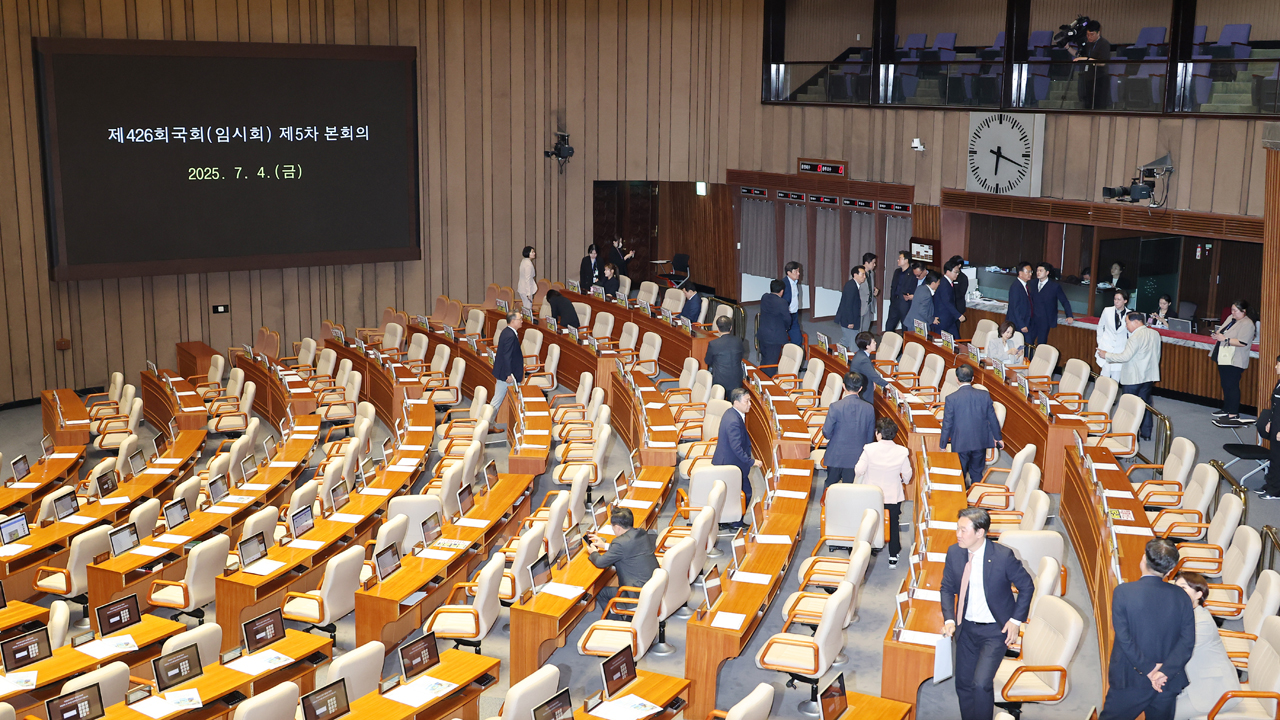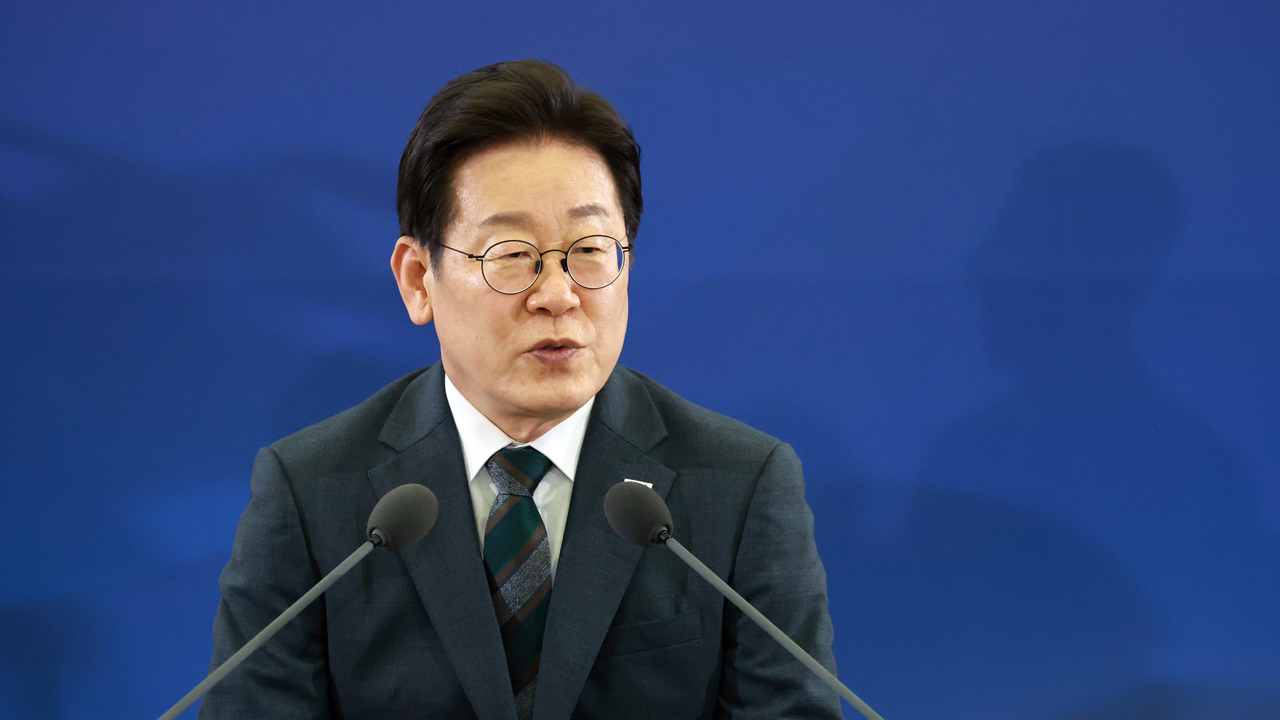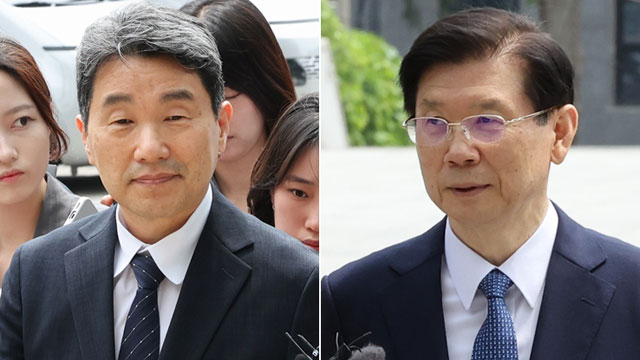Climate crisis approaching critical point
입력 2025.01.13 (00:49)
읽어주기 기능은 크롬기반의
브라우저에서만 사용하실 수 있습니다.
[Anchor]
Now, the climate crisis that has become a disaster before our eyes is approaching a critical point.
There are views that it could worsen this year.
Shouldn't we come up with some measures?
Experts unanimously say that the solution is to achieve carbon neutrality, which effectively reduces carbon emissions to zero.
This is Shin Bang-sil, a meteorology specialist.
[Report]
Last year, the climate crisis became a reality with unprecedented heavy snowfall and heatwaves.
We asked the KBS Climate Crisis Advisory Group what this year might hold.
It seems that such heatwaves could become the new normal in 2025.
[Min Seung-ki/Professor, Department of Environmental Engineering, POSTECH: "(The Earth's) temperature is rising, so it's natural for summers to get hotter and heatwaves to last longer. In a way, it's inevitable that we will experience heatwaves almost every year."]
[Kim Baek-min/Professor, Department of Environmental Atmospheric Sciences, Pukyong National University: "The alternating occurrence of extreme cold and extreme heat phenomena, with unpredictable weather becoming commonplace, is a very important characteristic."]
They point out that even the relatively mild typhoon damage last year cannot be taken lightly this year.
[Kim Baek-min/Professor, Department of Environmental Atmospheric Sciences, Pukyong National University: "The rapidly rising sea surface temperatures around the Korean Peninsula signal that super typhoons will definitely have an impact on our country."]
They warn that the traditional concept of four seasons may change, with summers getting longer and autumns and winters getting shorter.
[Jeong Soo-jong/Professor, Graduate School of Environmental Studies, Seoul National University: "The biggest concern is that the boundaries of the four seasons are collapsing. All social systems are based on the four seasons. It's not such a simple matter if everything has to change."]
Experts emphasize that the climate crisis is approaching a critical point and that we must hasten to achieve carbon neutrality, which is the only solution.
[Kook Jong-seong/Professor, Department of Earth and Environmental Sciences, Seoul National University: "Research has shown that even a slight delay in achieving carbon neutrality could trigger a tipping point in the climate. It is very difficult to restore a damaged climate."]
This is Shin Bang-sil for KBS News.
Now, the climate crisis that has become a disaster before our eyes is approaching a critical point.
There are views that it could worsen this year.
Shouldn't we come up with some measures?
Experts unanimously say that the solution is to achieve carbon neutrality, which effectively reduces carbon emissions to zero.
This is Shin Bang-sil, a meteorology specialist.
[Report]
Last year, the climate crisis became a reality with unprecedented heavy snowfall and heatwaves.
We asked the KBS Climate Crisis Advisory Group what this year might hold.
It seems that such heatwaves could become the new normal in 2025.
[Min Seung-ki/Professor, Department of Environmental Engineering, POSTECH: "(The Earth's) temperature is rising, so it's natural for summers to get hotter and heatwaves to last longer. In a way, it's inevitable that we will experience heatwaves almost every year."]
[Kim Baek-min/Professor, Department of Environmental Atmospheric Sciences, Pukyong National University: "The alternating occurrence of extreme cold and extreme heat phenomena, with unpredictable weather becoming commonplace, is a very important characteristic."]
They point out that even the relatively mild typhoon damage last year cannot be taken lightly this year.
[Kim Baek-min/Professor, Department of Environmental Atmospheric Sciences, Pukyong National University: "The rapidly rising sea surface temperatures around the Korean Peninsula signal that super typhoons will definitely have an impact on our country."]
They warn that the traditional concept of four seasons may change, with summers getting longer and autumns and winters getting shorter.
[Jeong Soo-jong/Professor, Graduate School of Environmental Studies, Seoul National University: "The biggest concern is that the boundaries of the four seasons are collapsing. All social systems are based on the four seasons. It's not such a simple matter if everything has to change."]
Experts emphasize that the climate crisis is approaching a critical point and that we must hasten to achieve carbon neutrality, which is the only solution.
[Kook Jong-seong/Professor, Department of Earth and Environmental Sciences, Seoul National University: "Research has shown that even a slight delay in achieving carbon neutrality could trigger a tipping point in the climate. It is very difficult to restore a damaged climate."]
This is Shin Bang-sil for KBS News.
■ 제보하기
▷ 카카오톡 : 'KBS제보' 검색, 채널 추가
▷ 전화 : 02-781-1234, 4444
▷ 이메일 : kbs1234@kbs.co.kr
▷ 유튜브, 네이버, 카카오에서도 KBS뉴스를 구독해주세요!
- Climate crisis approaching critical point
-
- 입력 2025-01-13 00:49:17

[Anchor]
Now, the climate crisis that has become a disaster before our eyes is approaching a critical point.
There are views that it could worsen this year.
Shouldn't we come up with some measures?
Experts unanimously say that the solution is to achieve carbon neutrality, which effectively reduces carbon emissions to zero.
This is Shin Bang-sil, a meteorology specialist.
[Report]
Last year, the climate crisis became a reality with unprecedented heavy snowfall and heatwaves.
We asked the KBS Climate Crisis Advisory Group what this year might hold.
It seems that such heatwaves could become the new normal in 2025.
[Min Seung-ki/Professor, Department of Environmental Engineering, POSTECH: "(The Earth's) temperature is rising, so it's natural for summers to get hotter and heatwaves to last longer. In a way, it's inevitable that we will experience heatwaves almost every year."]
[Kim Baek-min/Professor, Department of Environmental Atmospheric Sciences, Pukyong National University: "The alternating occurrence of extreme cold and extreme heat phenomena, with unpredictable weather becoming commonplace, is a very important characteristic."]
They point out that even the relatively mild typhoon damage last year cannot be taken lightly this year.
[Kim Baek-min/Professor, Department of Environmental Atmospheric Sciences, Pukyong National University: "The rapidly rising sea surface temperatures around the Korean Peninsula signal that super typhoons will definitely have an impact on our country."]
They warn that the traditional concept of four seasons may change, with summers getting longer and autumns and winters getting shorter.
[Jeong Soo-jong/Professor, Graduate School of Environmental Studies, Seoul National University: "The biggest concern is that the boundaries of the four seasons are collapsing. All social systems are based on the four seasons. It's not such a simple matter if everything has to change."]
Experts emphasize that the climate crisis is approaching a critical point and that we must hasten to achieve carbon neutrality, which is the only solution.
[Kook Jong-seong/Professor, Department of Earth and Environmental Sciences, Seoul National University: "Research has shown that even a slight delay in achieving carbon neutrality could trigger a tipping point in the climate. It is very difficult to restore a damaged climate."]
This is Shin Bang-sil for KBS News.
Now, the climate crisis that has become a disaster before our eyes is approaching a critical point.
There are views that it could worsen this year.
Shouldn't we come up with some measures?
Experts unanimously say that the solution is to achieve carbon neutrality, which effectively reduces carbon emissions to zero.
This is Shin Bang-sil, a meteorology specialist.
[Report]
Last year, the climate crisis became a reality with unprecedented heavy snowfall and heatwaves.
We asked the KBS Climate Crisis Advisory Group what this year might hold.
It seems that such heatwaves could become the new normal in 2025.
[Min Seung-ki/Professor, Department of Environmental Engineering, POSTECH: "(The Earth's) temperature is rising, so it's natural for summers to get hotter and heatwaves to last longer. In a way, it's inevitable that we will experience heatwaves almost every year."]
[Kim Baek-min/Professor, Department of Environmental Atmospheric Sciences, Pukyong National University: "The alternating occurrence of extreme cold and extreme heat phenomena, with unpredictable weather becoming commonplace, is a very important characteristic."]
They point out that even the relatively mild typhoon damage last year cannot be taken lightly this year.
[Kim Baek-min/Professor, Department of Environmental Atmospheric Sciences, Pukyong National University: "The rapidly rising sea surface temperatures around the Korean Peninsula signal that super typhoons will definitely have an impact on our country."]
They warn that the traditional concept of four seasons may change, with summers getting longer and autumns and winters getting shorter.
[Jeong Soo-jong/Professor, Graduate School of Environmental Studies, Seoul National University: "The biggest concern is that the boundaries of the four seasons are collapsing. All social systems are based on the four seasons. It's not such a simple matter if everything has to change."]
Experts emphasize that the climate crisis is approaching a critical point and that we must hasten to achieve carbon neutrality, which is the only solution.
[Kook Jong-seong/Professor, Department of Earth and Environmental Sciences, Seoul National University: "Research has shown that even a slight delay in achieving carbon neutrality could trigger a tipping point in the climate. It is very difficult to restore a damaged climate."]
This is Shin Bang-sil for KBS News.
-
-

신방실 기자 weezer@kbs.co.kr
신방실 기자의 기사 모음
-
이 기사가 좋으셨다면
-
좋아요
0
-
응원해요
0
-
후속 원해요
0















이 기사에 대한 의견을 남겨주세요.